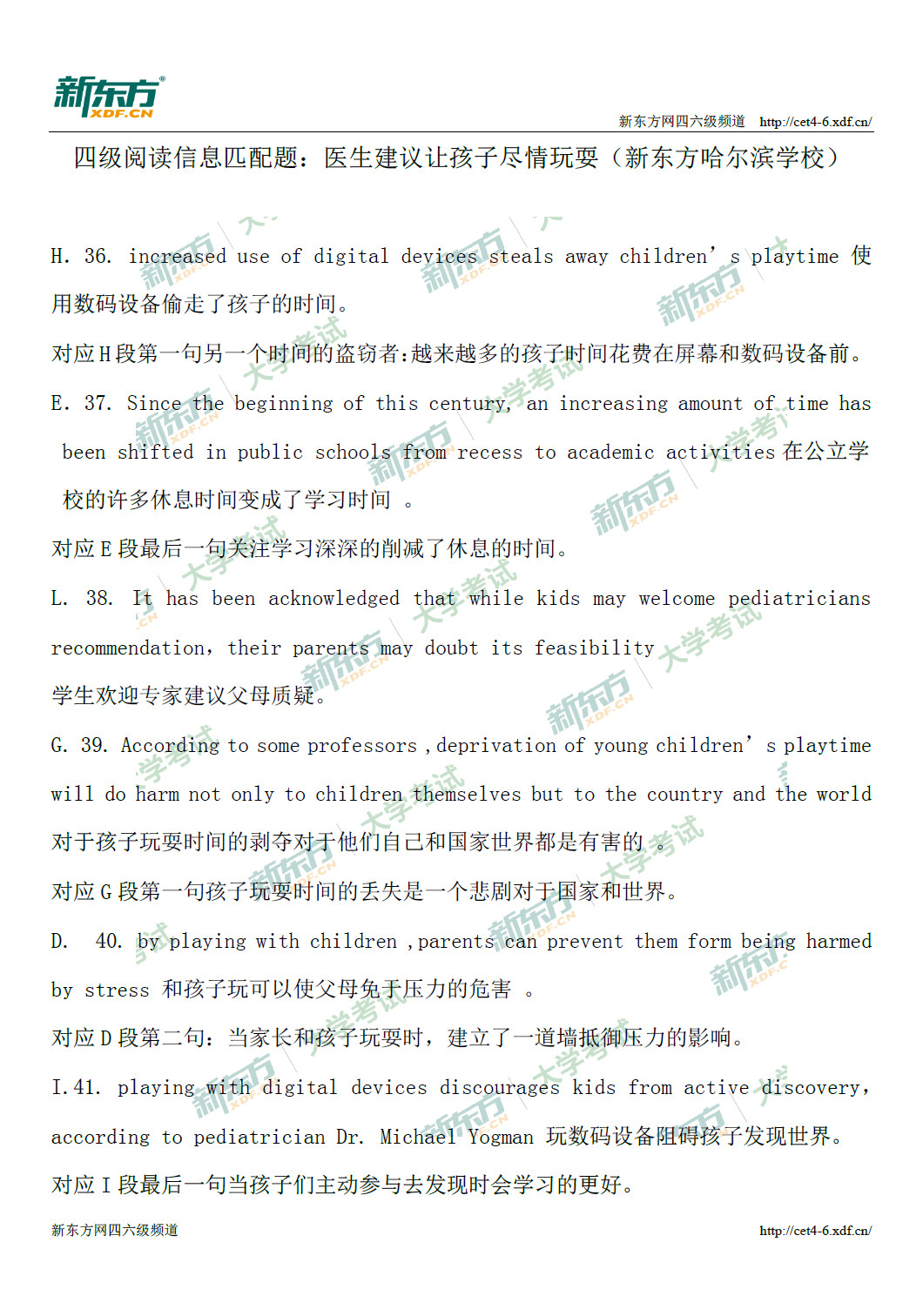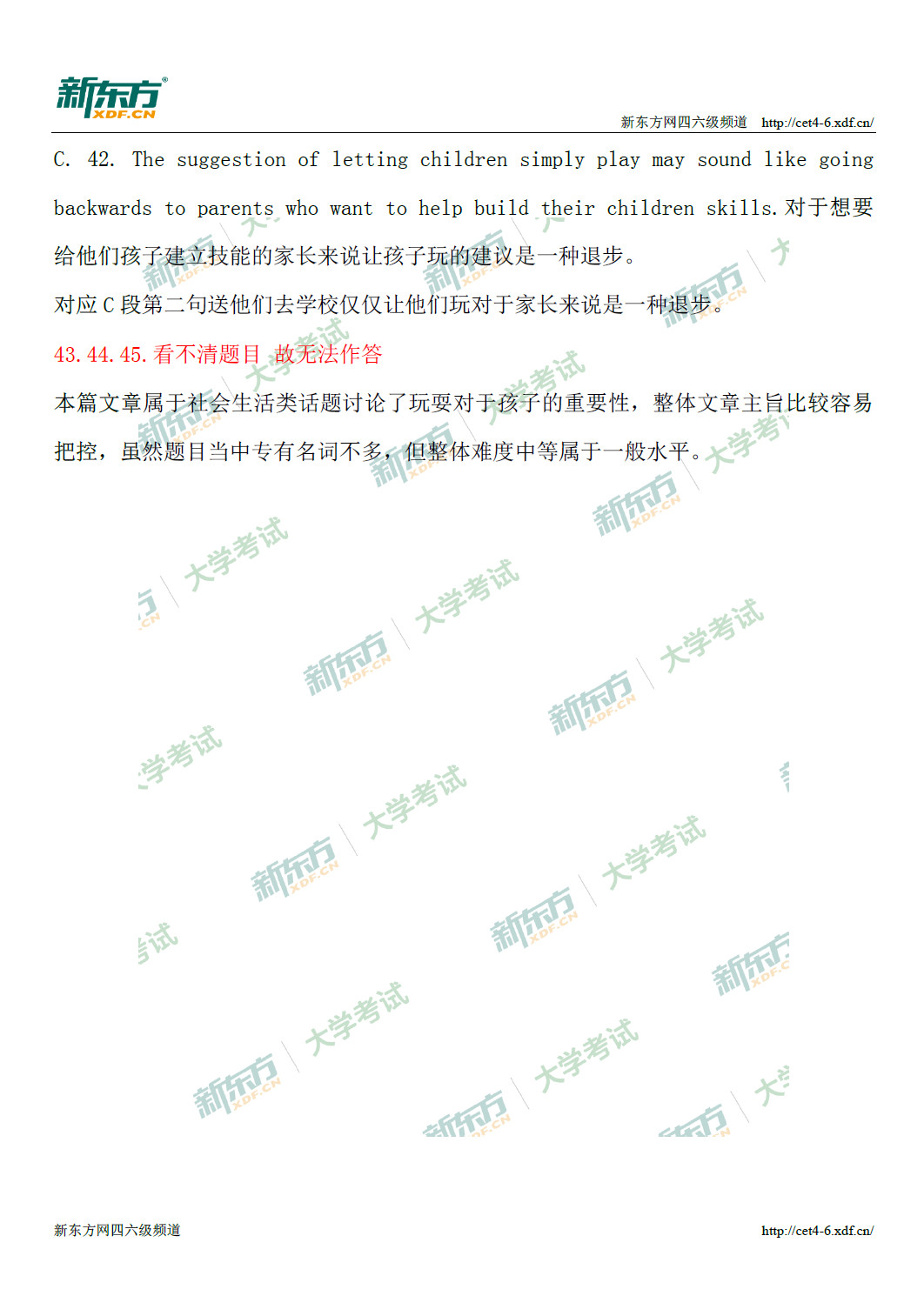45.1段落第 一句: How race and ethnicity is taught is cru-
2020年9月大学英语四级阅读真题仔细阅读第一套(网友版)
Does thinking you look fat affect how much money you earn?
Two things people often think about are money and their appearance. Past research has shown that there is a correlation between the two: People subjectively considered attractive earn more.
AddThis Sharing Buttons
Share to Facebook
Share to TwitterShare to WhatsAppShare to LinkedInShare to Email
Sunday, July 15, 2018 - 12:45 PM
Patricia Smith and Jay L. Zagorsky
Two things people often think about are money and their appearance. Past research has shown that there is a correlation between the two: People subjectively considered attractive earn more.
And body weight plays a major role in attractiveness. A person's body mass index - which adjusts a person's weight for their height - and their success in the workplace are linked. Put simply, thin people, especially women, are rewarded more than their larger colleagues. But those studies only considered how other people perceive you.
In new research, we looked at the flip side: Does our own perception of our bodies, even when incorrect, make a difference? In other words, does thinking you look fat or skinny affect your wages?
Knowing if a worker's own perception of his or her weight makes a difference - rather than only the employer's - could help determine the best way to mitigate the impact of weight discrimination on earnings. In addition, a better understanding of gender differences in weight perception might help explain the persistent gender wage gap.
Plus size model.
Pressure to 'look good'
Americans spend billions of dollars each year on making minor changes to their appearance with makeup, hair dye and other cosmetics. We also spend billions trying to change our weight with diets, gym memberships and plastic surgery.
Trying to live up to the pervasive images of "perfect" models and movie heroes has a dark side: body-shaming, anxiety and depression, as well as unhealthy strategies for weight loss or muscle gain. For example, anorexia nervosa involves the extreme over-perception of weight and claims the lives of roughly 10 percent of its victims. It also has a financial cost. Having an eating disorder boosts annual health care costs by nearly US$2,000 per person.
Why is there both external and internal pressure to look "perfect"? One reason is that society rewards people who are thin and healthy looking. Researchers have shown that body mass index is related to wages and income. Especially for women, there is a clear penalty at work for being overweight or obese. Some studies have also found an impact for men, though a less noticeable one.
Americans spend millions of dollars to change their appearances with hair dye, make up and plastic surgery.
Does weight perception matter?
While the research literature is clear that labor market success is partly based on how employers and customers perceive your body image, no one had explored the other side of question. Does a person's own perception of body image matter to earnings and other indicators of success in the workplace?
In simple terms, does it change your wages if you think of yourself as overweight when you are not? Or if you think of yourself as skinny, when in reality you are not, does this misperception affect your ability to find and keep a job?
We were interested in answering these questions because it is often easier to fix your own view of yourself than to fix the entire world's.
Our recently published study answered this question by tracking a large national random sample of the first wave of U.S. millennials, born in the early 1980s. We followed about 9,000 of them starting in 1997 when they were teenagers and ending 15 years later when the oldest was 31. Our research followed these respondents over a critical time period when bodies change from teenage shape into adult form and when people build their identities.
The survey asked respondents to report their actual weight and height. It also asked each to classify themselves each year as "very overweight," "overweight," "about the right weight," "slightly underweight" or "very underweight." This enabled us to compare each person's clinically defined BMI category, such as being underweight, with his or her perception.
As in other research, women in our sample tend to over-perceive weight - they think they're heavier than they are - while men tend to under-perceive theirs.
Americans spend billions on gym memberships every year.
What other people think matters more
While self-perceived weight, especially when incorrect, can influence self-esteem, mental health and health behaviors, we found no relationship between the average person's self-perception of weight and labor market outcomes like wages, weeks worked and the number of jobs.
In other words, it's not what you think about your appearance that matters in the workplace, it's just what other people think. Worrying if eating another cookie will make you look fat may harm your self-esteem, but thinking you're overweight likely will not affect your earnings.
Because we find that women earn lower wages than men do even when accounting for weight perception differences, it appears the well-known gender pay gap is not due to differences in self-perceived weight.
While the continued gender penalty in the labor market is frustrating, our finding that misperceived weight does not harm workers is more heartening. Weight misperception is common, but thinking you're heavier or lighter than you are doesn't dampen earnings.
At the same time, it's important to remember that although self-perceived weight doesn't appear to affect wages, it still takes a toll on mental and physical health.
Passing over heavier workers to hire or promote less productive but thinner workers is inefficient and unfair. Our results indicate that expanding efforts to reduce discrimination on the basis of body weight in the workplace is important.
Since employers' perception of weight is what matters in the labor market, policies to reduce the social stigmatization of body weight, such as curbing body-shaming, make sense. Changing discrimination laws to include body type as a category would also help. For example, Michigan is the only state that prohibits discrimination on the basis of weight and height.
We believe expanding such protections would make the labour market more efficient and fair.
仔细阅读第一套:
46-50 (diets)
46: D Attempting to meet society’S expectation of appear-ance
47: B They have to do with people’ s body weight and shape.
48: C Whether self-perception of body image impacts one’S workplace success.
49: B People are not adversely affected in the workplace by false self-perception of body weight.
50:A Banning discrimination on the bass of employees body image。
51-55 (work-life balance)
51.D The concept of work-life balance contributes little to a fulfilling life.
52.A It impacts how we think and behave.
53:C We do meaningful work the contributions to society.
54: B It is dynamic
55:D Strive for a more fulfilling life.
2020年9月大学英语四级阅读试题仔细阅读2源文
Pocket worthyStories to fuel your mind.
We Need to Stop Striving for Work-Life Balance. Here's Why.
Work-life balance makes us set our sights too low, according to this sociologist.
Fast Company
" Tracy Brower
Recently, I received a question from a contact on LinkedIn. She asked me whether I thought work-life balance was dead. My answer: I hope so!
To be clear, I'm not advocating that you should give up your quest to have a fulfilling career and a thriving personal life, and I am definitely not saying that you have to give up one to have the other. I also acknowledge that we have a work-life problem, but I'm arguing that the concept of balance has never been helpful, because it's too limiting.
You see, our language makes a difference, and how we refer to things matters because it affects our thinking and therefore our actions. My son is learning about linguistic determinism in school. (Yes, it sounds fancy, and it is.) The idea is that that the words we use shapes how we think. Inuit people have 50 different words for snow, and the Sami, who live in Norway, Sweden, and northern Finland have 1,000 different words for reindeer. Their needs to know, survive, and understand the environment shapes their language. The way they speak and express ideas affect their thinking and actions.
You might be wondering, what's wrong with the word "balance"? And what are these alternatives that supposedly help us frame the work-life problem better? Here are three compelling reasons.
1. Work-Life Balance Artificially Separates Work and Life
At the minimum, most of us work because we want to be able to support ourselves, our families, and the people around us. In the ideal world, we're all doing work that we're proud of and that provides meaning and purpose to us. But even if your job doesn't give you shivers of joy with each new day, working is a part of what each of us does and the contribution we make to society.
When you separate work and life, it's a little bit harder to make that connection. But when you think of work as part of a full life and a holistic experience, it becomes easier to see that success in one aspect often supports another.
2. Work-Life Balance Suggests a Precariousness That Isn't Helpful
Losing your balance and falling isn't pleasant. A goal to balance suggests that things are hanging in the balance-or could quickly get off balance, and that causes terrible outcomes.
It's more constructive to think of solutions that continue to evolve over shifts in life and work. Rather than falling or failing, you may have good days or better days or not-so-good days. These variations are normal, and it's more useful to think of life as an always evolving and changing from day-to-day or year-to-year, rather than a high-risk enterprise where things could go wrong with one misstep.
The thing is, most days probably won't look like an equilibrium. You might have to stay late at work and grab dinner on the way home one day or skip your work retreat this year because it coincides with your parents being in town. And there is nothing wrong with either of those choices.
3. Work-Life Balance Doesn't Allow Us to Think Big Enough
Lastly, I think that everyone deserves more than just balance. Balance is a limiting concept, and if we set the bar too low, we won't demand enough of ourselves, our leaders, and our companies. Right now, too many companies are still operating in an either/or mentality (though thankfully, it's starting to change). That's why there are still workplaces that penalizes parents who choose to take parental leave or assume that employees who don't put in as much "face time" aren't committed to their jobs.
I always like the mantra that "you can have it all, just not all at once." There are seasons of life where you'll have less time for yourself and will devote more to school or family or work. This is part of the normal ebb and flow of life. When you think big and expect that you can have a positive experience with all that work and life have to offer, you'll be more likely to make that happen.
How we talk to ourselves matters, and how we talk about issues makes a difference. This is a linguistic determinism. Let's bury "work-life balance" and think bigger and better about work-life fulfillment to do a little less balancing and a lot more living.


